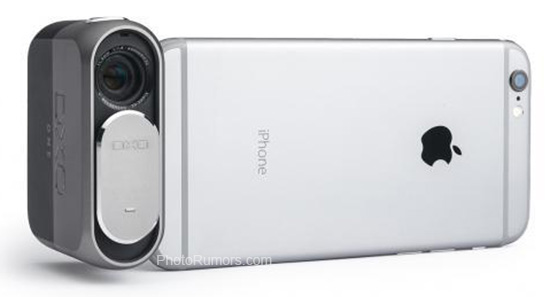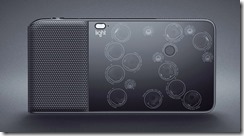Submitted by David Cardinal on Thu, 10/08/2015 - 10:30
Using a unique combination of computational imaging to combine images from 16 small sensors, and lenses that use mirrors to achieve long focal lengths in a thin package, startup Light has announced and demonstrated a 52MP camera about the size of a smartphone that features a 35mm-150mm optical zoom. You can read more details about it in , and I’m eagerly awaiting the point in the process where there are real units for review. In the meantime, let us know your thoughts about whether you’re likely to buy one of these, either at the pre-order price of $1300 or the retail price of $1700 when it ships in late summer 2016. Will you miss the zoom and focus rings on your DSLR, or the optical viewfinder, or be so glad to get rid of the weight and bulk that you’ll gladly trade them for a touchscreen?
Submitted by David Cardinal on Thu, 06/18/2015 - 06:58
 I’ve been working with a very exciting new camera that I’m happy to be able to tell you about now that it has been announced. It is called simply the ONE, from image processing software vendor DxO. DxO has used its industry-leading expertise in evaluating cameras and lenses, and creating image processing pipelines, to create a camera that works seamlessly with your iPhone, but produces much better images. The ONE is built around a 1-inch sensor – far larger than the ones found in mobile devices, including the one in the iPhone. It’s the same size sensor that’s found in much larger, high-end, compact cameras like the – that are also more expensive.
I’ve been working with a very exciting new camera that I’m happy to be able to tell you about now that it has been announced. It is called simply the ONE, from image processing software vendor DxO. DxO has used its industry-leading expertise in evaluating cameras and lenses, and creating image processing pipelines, to create a camera that works seamlessly with your iPhone, but produces much better images. The ONE is built around a 1-inch sensor – far larger than the ones found in mobile devices, including the one in the iPhone. It’s the same size sensor that’s found in much larger, high-end, compact cameras like the – that are also more expensive.
Submitted by David Cardinal on Tue, 09/09/2014 - 16:50
I get asked all the time to give advice about what camera someone should buy. Far less often I sometimes get asked a much more important question – “What do I need to learn how to do with my new camera before I take it on my vacation, or to some special event, and try to use it effectively?” Modern cameras (even many of those found in smartphones) have way too many features for anyone to master them all. But there are 10 basic skills you should learn. If you purchase your camera at a camera store with actual human salespeople (there are still a few), you can probably have them show you most or all of them before you walk out with your new kit:


 I’ve been working with a very exciting new camera that I’m happy to be able to tell you about now that it has been announced. It is called simply the ONE, from image processing software vendor DxO. DxO has used its industry-leading expertise in evaluating cameras and lenses, and creating image processing pipelines, to create a camera that works seamlessly with your iPhone, but produces much better images. The ONE is built around a 1-inch sensor – far larger than the ones found in mobile devices, including the one in the iPhone. It’s the same size sensor that’s found in much larger, high-end, compact cameras like the
I’ve been working with a very exciting new camera that I’m happy to be able to tell you about now that it has been announced. It is called simply the ONE, from image processing software vendor DxO. DxO has used its industry-leading expertise in evaluating cameras and lenses, and creating image processing pipelines, to create a camera that works seamlessly with your iPhone, but produces much better images. The ONE is built around a 1-inch sensor – far larger than the ones found in mobile devices, including the one in the iPhone. It’s the same size sensor that’s found in much larger, high-end, compact cameras like the 
